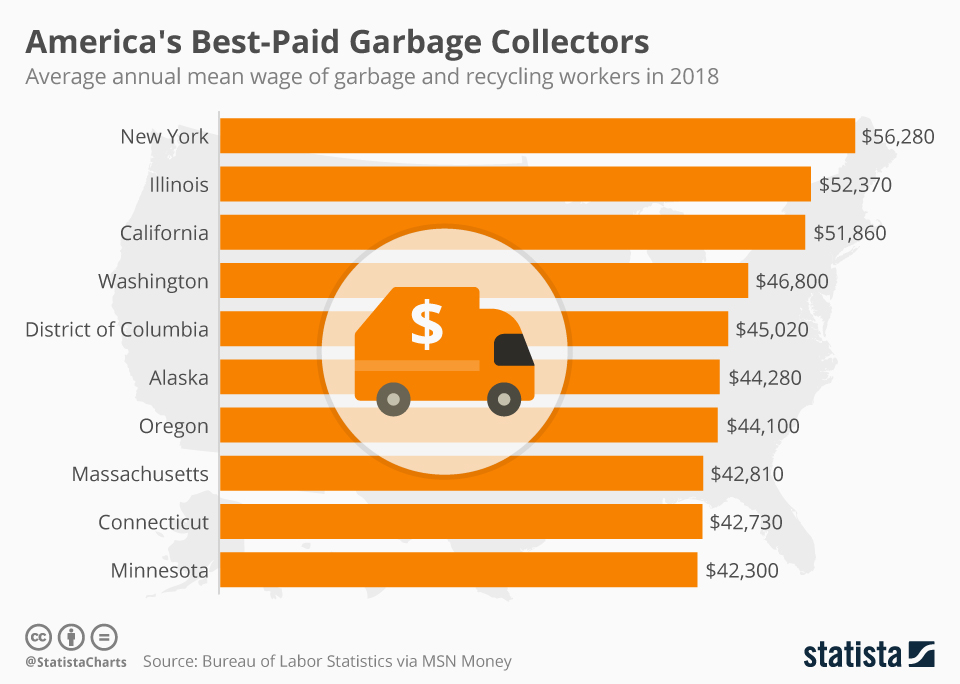Garbage men make an average of $40,000 to $60,000 annually. The salary varies based on location and experience.
Garbage men, also known as sanitation workers or waste collectors, play a crucial role in maintaining clean and hygienic communities. They are responsible for collecting, sorting, and disposing of residential and commercial waste. The job often requires working in various weather conditions and handling heavy equipment.
Despite the physically demanding nature of the work, many individuals find it to be a stable and fulfilling career. In addition to a competitive salary, garbage men may also receive benefits such as healthcare and retirement plans. The demand for waste management services continues to grow, providing opportunities for those interested in pursuing a career in this essential field.

Credit: www.statista.com
The Role Of Garbage Men In Society
Garbage men play a crucial role in society by keeping our communities clean. Their average earnings vary depending on location and experience, but they typically make a decent income. Working as a garbage man offers stability and an essential service to society.
Garbage men, also known as waste collectors or sanitation workers, play a crucial role in keeping our cities and towns clean and healthy. They are responsible for collecting and disposing of waste, which includes everything from household trash to hazardous materials. While their job may not be glamorous, it is essential for maintaining public health and protecting the environment. In this blog post, we will explore the vital environmental contributions and public health benefits of garbage men.
Vital Environmental Contributions
Garbage men make significant contributions to the environment by ensuring that waste is properly disposed of. They collect trash and transport it to landfills or recycling centers, which helps prevent pollution and maintain clean streets. Moreover, they play a crucial role in reducing greenhouse gas emissions by diverting waste from landfills and promoting recycling. By recycling materials such as paper, glass, and plastic, garbage men help conserve natural resources and reduce the need for new landfills. Their efforts also contribute to the circular economy, where waste is repurposed to create new products, reducing the need for raw materials.
Public Health Guardians
Garbage men are not just responsible for waste collection, they are also public health guardians. By removing garbage from residential and commercial areas, they help prevent the spread of diseases and pests that can harm public health. They are trained to handle hazardous materials, such as medical waste and chemicals, which require special handling to prevent contamination.
Moreover, they play a crucial role in responding to emergencies, such as natural disasters, by removing debris and restoring public spaces. In conclusion, garbage men play an essential role in our society by keeping our cities and towns clean, protecting the environment, and ensuring public health. Their contributions often go unnoticed, but they are critical for maintaining the quality of life we enjoy. We should show our appreciation for their hard work and recognize their vital role in keeping our communities safe and healthy.
Income Factors For Garbage Collectors
When considering a career as a garbage collector, it’s important to understand the various factors that can affect your income. Several key elements come into play when determining how much a garbage collector can make, including experience, location, unionization, and benefits. Let’s take a closer look at each of these income factors:
Experience
Experience plays a significant role in determining the income of garbage collectors. As with many professions, the more experience you have, the higher your earning potential. Starting out in the field, you can expect to earn an entry-level wage. However, as you gain more experience, your salary can increase significantly. Garbage collectors who have been in the industry for several years may be eligible for promotions, which often come with higher pay rates.
Location
The location where you work as a garbage collector can also impact your income. Wages for this profession can vary depending on the cost of living and demand for garbage collection services in a particular area. In some cities or regions, the salary may be higher due to higher living expenses, while in other areas, the salary may be lower. Additionally, urban areas with a higher population density may have a greater need for garbage collectors, potentially resulting in higher wages.
Unionization And Benefits
Many garbage collectors are part of labor unions, which can have a positive impact on their income. Unions negotiate on behalf of workers to secure better wages, benefits, and working conditions. Being a part of a union can provide garbage collectors with a higher income compared to non-unionized workers. Additionally, unionized garbage collectors often receive benefits such as health insurance, retirement plans, and paid time off, which can further enhance their overall compensation.
In conclusion, the income of garbage collectors is influenced by various factors including experience, location, unionization, and benefits. By considering these income factors, individuals interested in pursuing a career in this field can have a better understanding of the earning potential associated with becoming a garbage collector.
Average Salaries Across The Us
Garbage men earn varying salaries across the US, averaging around $40,000 to $60,000 annually depending on location and experience. These essential workers play a crucial role in maintaining cleanliness and sanitation in communities nationwide.
State-by-state Breakdown
When it comes to garbage men salaries in the US, there is a wide range of earnings depending on the state they work in. According to the Bureau of Labor Statistics, the highest-paying state for garbage collectors is Alaska, where they earn an average of $47,950 per year. On the other hand, the lowest-paying state is Mississippi, with an average annual salary of $22,710. Here’s a state-by-state breakdown of garbage men salaries across the US:
| State | Average Annual Salary |
|---|---|
| Alabama | $29,070 |
| Alaska | $47,950 |
| Arizona | $35,660 |
| Arkansas | $30,110 |
| California | $41,650 |
| Colorado | $34,270 |
| Connecticut | $39,670 |
| Delaware | $34,490 |
| Florida | $32,980 |
| Georgia | $30,590 |
| Hawaii | $44,060 |
| Idaho | $33,750 |
| Illinois | $39,710 |
| Indiana | $34,480 |
| Iowa | $33,440 |
| Kansas | $32,510 |
| Kentucky | $31,320 |
| Louisiana | $29,610 |
| Maine | $35,820 |
| Maryland | $38,830 |
| Massachusetts | $41,870 |
| Michigan | $34,780 |
| Minnesota | $38,080 |
| Mississippi | $22,710 |
| Missouri | $32,120 |
| Montana | $34,020 |
| Nebraska | $33,310 |
| Nevada | $35,040 |
| New Hampshire | $35,940 |
| New Jersey | $38,570 |
| New Mexico | $31,240 |
| New York | $39,080 |
| North Carolina | $32,900 |
| North Dakota | $36,340 |
| Ohio | $34,510 |
| Oklahoma | $31,830 |
| Oregon | $36,790 |
| Pennsylvania | $36,320 |
| Rhode Island | $37,840 |
| South Carolina | $31,570 |
| South Dakota | $31,310 |
| Tennessee | $30,410 |
| Texas | $32,800 |
| Utah | $35,530 |
| Vermont | $35,590 |
| Virginia | $34,700 |
| Washington | $40,930 |
| West Virginia | $27,600 |
| Wisconsin | $35,120 |
| Wyoming | $35,870 |
City Compensation Comparisons
Not only does the state impact garbage men salaries, but the city they work in can also make a difference. How Much Do Garbage Men Make? For instance, a garbage collector in New York City can earn up to $45,000 per year, while one in Buffalo, NY earns an average of $31,000 annually. Here are some city compensation comparisons for garbage collectors:
- New York City, NY: $45,000
- Los Angeles, CA: $41,000
- Chicago, IL: $43,000
- Houston, TX: $33,000
- Philadelphia, PA: $34,000
- Phoenix, AZ: $33,000
- San Antonio, TX: $31,000
- San Diego, CA: $37,000
- Dallas, TX: $33,000
- San Jose, CA: $43,000
Whether you’re considering a career as a garbage collector or just curious about how much they make, it’s important to note that salaries vary greatly depending on location. However, no matter where they work, garbage collectors provide an essential service to their communities and deserve fair compensation for their hard work.

Credit: money.cnn.com
International Earnings Perspective
When it comes to the earnings of garbage men, it’s essential to consider the international perspective. Garbage men, also known as waste collectors or sanitation workers, play a crucial role in maintaining the cleanliness and health of communities worldwide. Understanding their earnings on a global scale can provide valuable insights into the economic impact on pay and how wages compare across different countries.
Comparing Global Wages
Garbage men in different countries earn varying wages, depending on factors such as the cost of living, economic development, and government regulations. For instance, in the United States, the average annual salary for garbage collectors is around $40,000, while in countries with lower income levels, such as India, the average annual earnings may be significantly lower, at around $4,000.
Economic Impact On Pay
The economic conditions of a country directly influence the pay scale for garbage men. In countries with robust economies and higher living standards, such as those in Western Europe, garbage collectors tend to receive more competitive wages compared to their counterparts in developing nations. Additionally, government policies and labor regulations also impact the earning potential of these essential workers.
Additional Income Sources
Garbage men not only earn a steady income from their regular salaries but also have the opportunity to boost their earnings through various additional income sources. These additional sources can significantly contribute to their overall income and provide them with financial stability. Let’s explore two common additional income sources for garbage men: overtime and bonuses, as well as recycling incentives.
Overtime And Bonuses
Garbage men often have the chance to earn extra income through overtime work and bonuses. Overtime pay is provided when they exceed their regular working hours, which can occur during periods of high demand or special circumstances. This allows them to earn a higher hourly rate for the additional time worked. Bonuses, on the other hand, are additional monetary rewards that are given based on performance, productivity, or meeting specific targets.
By taking advantage of overtime opportunities and striving to meet or exceed their performance goals, garbage men can significantly increase their monthly income. These additional earnings not only reward their hard work but also provide them with the means to support themselves and their families more comfortably.
Recycling Incentives
In addition to overtime and bonuses, garbage men can also benefit from recycling incentives. As recycling becomes increasingly important for environmental sustainability, many waste management companies offer incentives to encourage proper recycling practices.
These incentives can take various forms, such as financial rewards, gift cards, or even discounts on utility bills. Garbage men who actively participate in recycling programs and ensure that recyclable materials are properly separated and collected can earn these rewards on top of their regular income.
Not only do recycling incentives provide an opportunity for garbage men to earn extra income, but they also contribute to the overall well-being of the environment. By promoting recycling and reducing waste, garbage men play a vital role in creating a cleaner and greener future for their communities.
Garbage men have the potential to earn additional income through various sources such as overtime, bonuses, and recycling incentives. By maximizing these opportunities, they can enhance their financial stability while also contributing to the sustainability of the environment.

Credit: money.cnn.com
The Reality Of Wage Growth
Garbage men’s wages reflect the reality of wage growth, with variations depending on factors such as location and experience. Salaries can range from around $30,000 to $60,000 per year, providing a decent income for their important work in keeping our communities clean.
Career Progression
Garbage men, also known as waste management workers, have the opportunity for career progression within their field. While the starting wage may not be as high as other professions, there is potential for growth and advancement. As these workers gain experience and develop their skills, they can move up the ranks to higher positions. One common career progression path for garbage men is to become a driver. This role involves operating the garbage truck and managing the collection routes. Drivers are responsible for ensuring that waste is collected efficiently and safely. With this promotion, garbage men can earn a higher salary due to the added responsibility.
Another potential career progression for garbage men is to become a supervisor or manager. In these roles, individuals oversee the operations of the entire waste management team. They are responsible for coordinating schedules, managing budgets, and ensuring compliance with regulations. Supervisors and managers typically earn higher salaries than entry-level garbage men.
Inflation Adjustments
It’s important to consider inflation when discussing the wages of garbage men. Over time, the cost of living increases due to inflation, which can impact the purchasing power of a worker’s salary. While the wages of garbage men may not have grown significantly in recent years, it’s crucial to take into account the impact of inflation. To better understand the reality of wage growth for garbage men, it can be helpful to adjust their salaries for inflation. By doing so, we can determine whether their wages have kept up with the rising cost of living. This analysis provides a more accurate picture of the earning potential and financial stability of garbage men over time.
In conclusion, garbage men have opportunities for career progression within the waste management industry. They can advance to positions such as drivers, supervisors, or managers, which offer higher salaries and increased responsibilities. Additionally, when considering wage growth, it’s essential to factor in inflation adjustments to gain a clearer understanding of the real value of their earnings. This analysis helps to paint a more accurate picture of the financial outlook for garbage men.
Benefits And Perks For Garbage Men
Garbage men enjoy various benefits and perks as part of their compensation package. Let’s explore some of the key benefits that come with working in this essential profession.
Health Insurance
Garbage men are typically provided with comprehensive health insurance coverage. This includes medical, dental, and vision plans, ensuring they have access to healthcare services when needed.
Retirement Plans
Garbage men often have access to retirement plans such as 401(k) or pension plans. These plans help them save for the future and secure their financial well-being after they retire.
Challenges In The Waste Management Industry
Waste management workers face various challenges daily, from job hazards to the impact of automation. These challenges play a crucial role in determining the salaries of garbage men.
Job Hazards And Security
Garbage collectors are exposed to dangerous working conditions such as heavy lifting and exposure to hazardous materials.
- Heavy lifting
- Exposure to hazardous materials
- Risk of accidents
Impact Of Automation
Automation in waste management can lead to job displacement and reduced job opportunities for garbage men.
- Job displacement
- Reduced job opportunities
- Need for new skills
Frequently Asked Questions
What Is The Average Salary Of A Garbage Collector?
Garbage collectors typically earn an average salary of $40,000 to $60,000 per year, varying by location and experience.
How Do Garbage Men’s Salaries Compare To Other Jobs?
Garbage men’s salaries can be competitive, often comparable to other essential service roles like postal workers or janitors.
Are There Opportunities For Career Advancement In This Field?
Yes, garbage men can advance to supervisory roles or specialize in areas like hazardous waste disposal for increased earning potential.
Conclusion
Garbage men’s salaries vary, but they can earn a decent income. Factors such as experience, location, and company can impact earnings. It’s important to research the specific details in your area. Overall, a career as a garbage man can provide a stable and rewarding livelihood.